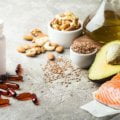As cloudy skies show sunnier, you are probably checking your sunscreen stash. But it would help if you also saw what is in your kitchen, as a few foods can help make your skin younger and healthier.
“There are absolutely foods that we eat that can raise our ability to shield our skin from the sun,” stated Dr. Patricia Farris, a dermatologist and fellow of the American Academy of Dermatology.
In terms of protecting yourself from sun damage, solar safety is the most essential, like carrying a wide-spectrum sunscreen with an SPF of at least 30, in conjunction with sunglasses and hats, “however I could position eating regimen right at the back of that — and that’s because there are so many components that you can consume from meals which have this kind of distinct defensive results,” stated Dr. Rajani Katta, creator of “Glow: The Dermatologist’s Guide to a Whole Foods Younger Skin Diet.” Even if you’re not sunbathing on the seaside, you may have incidental solar exposure as you pass about your day, “and so ensuring that there are high stages of nutrients in your pores and skin is truly going to help restriction that solar damage,” Katta delivered.
Antioxidants: suitable for eating sunscreens
There are several approaches wherein foods can affect your pores and skin, shielding you from wrinkles, sunburn, pores, and skin cancer. However, the maximum number of mechanisms relates to antioxidants and anti-aging compounds in meals that fight skin harm in one-of-a-kind approaches. For instance, carotenoids are antioxidants that provide pigment to the orange and pink results and veggies, and they move using names such as lycopene, lutein, and beta carotene. Carotenoids and polyphenols like EGCG in inexperienced tea, resveratrol in purple grapes, and ellagic acid in berries offer herbal sun safety.
According to Farris, carotenoids and polyphenols accumulate in the skin and absorb sunlight of diverse wavelengths. However, the skin benefits of these natural compounds are primarily due to their antioxidant activity. Along with antioxidants like vitamin C and vitamin E, they protect against free radical damage to cells generated from the sun’s UV rays, which could cause pores and skin to age.
For instance, free radicals reason damage to proteins, including collagen and elastin, resulting in satisfactory strains, wrinkles, sagging, loss of elasticity, and brown spots, according to Katta. Free radicals also can harm lipids in mobile membranes, resulting in sagging and hard, dry skin. When antioxidants forestall unfastened radicals of their tracks, in addition, they save you DNA damage, thereby reducing mutations and reducing the threat of pores and skin most cancers, Katta defined.
Then, there are antioxidants’ anti-inflammatory effects, which protect against sunburn. For instance, carotenoids, polyphenols, vitamins C and E, and omega-three fatty acids deliver anti-inflammatory advantages to pores and skin, which allows for decreasing the improvement of sunburn and may lower the chance for skin cancer, Farris stated.
Supplements such as sunscreen?
Though antioxidants from ingredients confer solar protection to the skin, eating them in supplement shape poses a risk. Oxidation is a finely balanced method; this means that at excessive degrees, antioxidants could morph into “pro-oxidants” and create more harm, specialists say. Complicating the issue is that one-of-a-kind supplements include distinct protection profiles. For example, Heliocare is a fern extract with an antioxidant pastime and has been nicely researched, consistent with Farris.
“There are many truly suitable studies that display it reduces sunburn, oxidative stress, and DNA damage.” It may be useful for humans at high risk for pores and skin cancers or for tennis players who want some greater photoprotection, Farris defined. However, a study from France found an expanded incidence of cancer in ladies who took an antioxidant supplement.
“These consequences were unexpected, and the increased chance of skin most cancers disappeared after the antioxidant supplement was discontinued in a 5-year follow-up study,” Farris said. “So it seems that we still have loads greater to find out about the dangers and benefits of antioxidant supplements.” Katta introduced, “Whole meals comprise more than one phytonutrient in a single bundle. And you could additionally make sure you’re now not getting too much. It’s the best way to get the right dose of them.”
Edible sunscreens: a buying listing
For more youthful-looking pores and skin, your weight loss plan must encompass masses of antioxidant-rich foods to assist in lowering sunburn and neutralize free radicals that cause the skin to get older and the capability for skin cancers. “Antioxidants in our skin are constantly getting used up at some point of the day, so it’s crucial that you continuously refill that supply of antioxidants thru your food regimen,” Katta stated. In addition to imparting antioxidant protection, fruits and veggies boast fiber, which feeds bacteria to your gut, making your skin’s barrier much less at risk of inflammation and much less in all likelihood to lose moisture, Katta explained.
Tomatoes
Tomatoes are a terrific source of lycopene, an antioxidant pigment that could play a position in shielding against sunburn. In one observation, sunburn formation significantly decreased amongst folks who fed on a small amount of tomato paste daily for ten weeks. “If you devour approximately three tablespoons of tomato paste every single day for ten weeks, at the cease of that ten weeks, you can see that your pores and skin does no longer show up the equal degree of solar harm,” Katta said.












